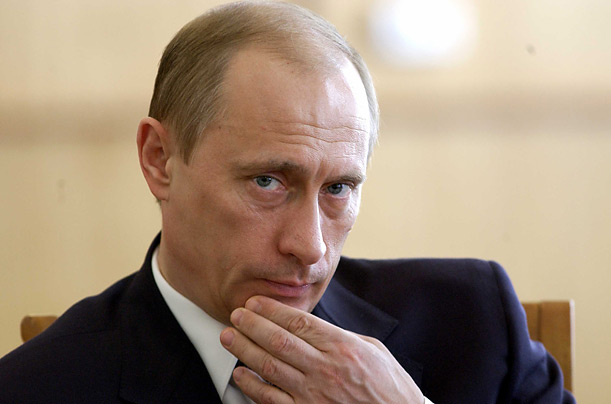Russian President Vladmir Putin in a Wednesday New York Times column titled “A Plea for Caution From Russia” urges Americans to look at the conflict in Syria cautiously and diplomatically. Frankly, the piece drips with condescension and contempt, though Putin attempts to sugarcoat this with historical allusions and appeals to American prudence. Putin is clearly just trolling America while he takes the dominant role in shaping American foreign policy. To keep our readers sane, we decided to pull out several selections from Putin’s 1000-word essay and cut out all the BS to tell it like it really is.
Videos by Rare
What Putin wrote:
“Recent events surrounding Syria have prompted me to speak directly to the American people and their political leaders. It is important to do so at a time of insufficient communication between our societies.”
What Putin meant:
“Barack hasn’t been returning my calls. I think he’s still kind of pissed about the whole Edward Snowden thing and the fact that I’ve been making him look like an idiot on a global level. Can you make sure he gets this message?”
What Putin wrote:
“No one wants the United Nations to suffer the fate of the League of Nations, which collapsed because it lacked real leverage.”
What Putin meant:
“I will now take the time to teach you a little history lesson because you Americans probably wouldn’t know the League of Nations from the Justice League. Although, if the United Nations were the Justice League, Russia would totally be Superman and the United States would be Aquaman.”
What Putin wrote:
“A strike would increase violence and unleash a new wave of terrorism. It could undermine multilateral efforts to resolve the Iranian nuclear problem and the Israeli-Palestinian conflict and further destabilize the Middle East and North Africa. It could throw the entire system of international law and order out of balance.”
What Putin meant:
“Going to war with Syria would be a major bummer for Russia. Assad and I are bros and this would kind of put me in the doghouse. And I guess some other bad things would happen, too.”
What Putin wrote:
“From the outset, has advocated peaceful dialogue enabling Syrians to develop a compromise plan for their own future. We are not protecting the Syrian government, but international law.”
What Putin meant:
“If by international law you mean the Syrian government.”
What Putin wrote:
“No one doubts that poison gas was used in Syria. But there is every reason to believe it was used, not by the Syrian Army, but by opposition forces to provoke intervention by their powerful foreign patrons, who would be siding with the fundamentalists.”
What Putin meant:
“OK, so maybe Assad did use poison gas. But the rebels totally started it.”
What Putin wrote:
“It is alarming that military intervention in internal conflicts in foreign countries has become commonplace for the United States. Is it in America’s long-term interest? I doubt it. Millions around the world increasingly see America not as a model of democracy but as relying solely on brute force, cobbling coalitions together under the slogan “you’re either with us or against us.”
What Putin meant:
“When you guys had Bush as president, you were the douchebags of the world. Now you’re kind of like the class clown nobody really takes seriously. Why would you want to go back to being douchebags? If I know one thing, it’s that nobody likes a douchebag.
What Putin wrote:
“But force has proved ineffective and pointless. Afghanistan is reeling, and no one can say what will happen after international forces withdraw. Libya is divided into tribes and clans. In Iraq the civil war continues, with dozens killed each day. In the United States, many draw an analogy between Iraq and Syria, and ask why their government would want to repeat recent mistakes.”
What Putin meant:
“Honestly, I’ve seen World of Warcraft players make better foreign-policy decisions than you.
What Putin wrote:
“If we can avoid force against Syria, this will improve the atmosphere in international affairs and strengthen mutual trust. It will be our shared success and open the door to cooperation on other critical issues.”
What Putin meant:
“This would really give me time to bro out with my best bro Assad. Did I mention that me and Assad are bros?
What Putin wrote:
“My working and personal relationship with President Obama is marked by growing trust. I appreciate this.”
What Putin meant:
“Seriously, Barack, stop screening my calls. I promise I’ll stop bringing up the whole Benghazi thing. Gosh, you’re so sensitive.”
What Putin wrote:
“I carefully studied his address to the nation on Tuesday. And I would rather disagree with a case he made on American exceptionalism, stating that the United States’ policy is ‘what makes America different. It’s what makes us exceptional.’ It is extremely dangerous to encourage people to see themselves as exceptional, whatever the motivation. There are big countries and small countries, rich and poor, those with long democratic traditions and those still finding their way to democracy. Their policies differ, too. We are all different, but when we ask for the Lord’s blessings, we must not forget that God created us equal.”
What Putin meant:
“You guys act like you’re the cat’s pajamas, but you’re really not all that. Oh, you think you’re legit because you have all-access cable and Boyz 2 Men? Well, we have cool things in Russia, too, like vodka and really tall women. So, just chill it with the whole ‘we’re-better-than-you-because-we-have-a-freedoom-of-speech’ thing. It’s really getting old and nobody likes a try-hard. But for real, if one of you could hook me up with Boyz 2 Men’s agent that’d be awesome. I’ve been trying to get them to come to Russia for years.
Richard Thompson is an editorial intern for Rare. Follow him on Twitter @RThompson_91
Related articles
- White House responds to Putin’s NYT op-ed (thelead.blogs.cnn.com)
- Sen. Menendez reacts to Putin’s op-ed: I wanted to vomit (thelead.blogs.cnn.com)



